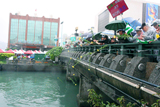More than 100 people marched in Keelung yesterday in remembrance of those killed by Chinese Nationalist Party (KMT) troops that landed on March 8, 1947, in the aftermath of the 228 Incident.
“It’s raining today [yesterday], and so it was on this day 62 years ago when the KMT troops landed at Keelung in the afternoon,” Chang Yen-hsien (張炎憲), chairman of the 228 Care Association and a historian specializing in modern Taiwanese history, told people gathered at Keelung Harbor’s west pier.
“As soon as they disembarked, soldiers started shooting indiscriminately at people. There were dead bodies everywhere, in the city and floating in the harbor,” Chang said.

PHOTO: WENG YU-HUANG, TAIPEI TIMES
The troops were sent by dictator Chiang Kai-shek (蔣介石) to quell an uprising against KMT rule that broke out in Taipei on Feb. 28, 1947, and quickly spread.
Chou Chen-tsai (周振才) recalled the trauma.
“The KMT troops began to knock on doors randomly on the morning of March 9 searching for young people [who may have been involved in the uprising] and arrested my uncle and brother,” Chou said, adding that his uncle and brother had not taken part in the uprising and that his father was a KMT Keelung City councilor at the time.
“As soon as my mother — who was pregnant at the time — heard the news, she took a large sum of money and rushed to ‘buy’ their lives,” Chou said.
Chou’s brother returned after his mother bribed officials, but it was too late to save his uncle, who had already been executed and thrown into Tianliao River.
Although Chou’s father was a KMT member, he remained in hiding for months because the government accused him of helping anti-KMT guerillas by stockpiling rice.
“In reality he was handing out rice to poverty-stricken Keelung residents hit by the severe inflation at the time,” Chou said.
After observing a minute of silence, the marchers — holding flowers — proceeded through the city, recounting the details of massacre through a loudspeaker.
The march concluded on a bridge near the mouth of Tianliao River at Keelung Harbor, where marchers threw their flowers into the river to remember those who died.

Alain Robert, known as the "French Spider-Man," praised Alex Honnold as exceptionally well-prepared after the US climber completed a free solo ascent of Taipei 101 yesterday. Robert said Honnold's ascent of the 508m-tall skyscraper in just more than one-and-a-half hours without using safety ropes or equipment was a remarkable achievement. "This is my life," he said in an interview conducted in French, adding that he liked the feeling of being "on the edge of danger." The 63-year-old Frenchman climbed Taipei 101 using ropes in December 2004, taking about four hours to reach the top. On a one-to-10 scale of difficulty, Robert said Taipei 101

A preclearance service to facilitate entry for people traveling to select airports in Japan would be available from Thursday next week to Feb. 25 at Taiwan Taoyuan International Airport, Taoyuan International Airport Corp (TIAC) said on Tuesday. The service was first made available to Taiwanese travelers throughout the winter vacation of 2024 and during the Lunar New Year holiday. In addition to flights to the Japanese cities of Hakodate, Asahikawa, Akita, Sendai, Niigata, Okayama, Takamatsu, Kumamoto and Kagoshima, the service would be available to travelers to Kobe and Oita. The service can be accessed by passengers of 15 flight routes operated by

Taiwanese and US defense groups are collaborating to introduce deployable, semi-autonomous manufacturing systems for drones and components in a boost to the nation’s supply chain resilience. Taiwan’s G-Tech Optroelectronics Corp subsidiary GTOC and the US’ Aerkomm Inc on Friday announced an agreement with fellow US-based Firestorm Lab to adopt the latter’s xCell, a technology featuring 3D printers fitted in 6.1m container units. The systems enable aerial platforms and parts to be produced in high volumes from dispersed nodes capable of rapid redeployment, to minimize the risk of enemy strikes and to meet field requirements, they said. Firestorm chief technology officer Ian Muceus said

MORE FALL: An investigation into one of Xi’s key cronies, part of a broader ‘anti-corruption’ drive, indicates that he might have a deep distrust in the military, an expert said China’s latest military purge underscores systemic risks in its shift from collective leadership to sole rule under Chinese President Xi Jinping (習近平), and could disrupt its chain of command and military capabilities, a national security official said yesterday. If decisionmaking within the Chinese Communist Party has become “irrational” under one-man rule, the Taiwan Strait and the regional situation must be approached with extreme caution, given unforeseen risks, they added. The anonymous official made the remarks as China’s Central Military Commission Vice Chairman Zhang Youxia (張又俠) and Joint Staff Department Chief of Staff Liu Zhenli (劉振立) were reportedly being investigated for suspected “serious